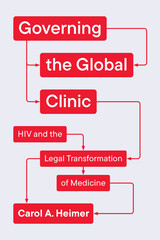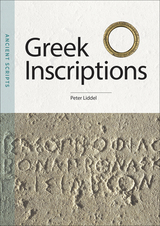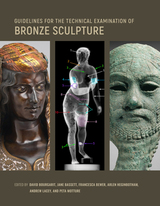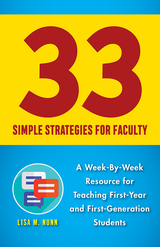
Many students struggle with the transition from high school to university life. This is especially true of first-generation college students, who are often unfamiliar with the norms and expectations of academia. College professors usually want to help, but many feel overwhelmed by the prospect of making extra time in their already hectic schedules to meet with these struggling students.
33 Simple Strategies for Faculty is a guidebook filled with practical solutions to this problem. It gives college faculty concrete exercises and tools they can use both inside and outside of the classroom to effectively bolster the academic success and wellbeing of their students. To devise these strategies, educational sociologist Lisa M. Nunn talked with a variety of first-year college students, learning what they find baffling and frustrating about their classes, as well as what they love about their professors’ teaching.
Combining student perspectives with the latest research on bridging the academic achievement gap, she shows how professors can make a difference by spending as little as fifteen minutes a week helping their students acculturate to college life. Whether you are a new faculty member or a tenured professor, you are sure to find 33 Simple Strategies for Faculty to be an invaluable resource.
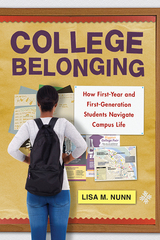
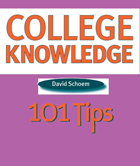
What educators and students have to say about David Schoem's College Knowledge:
"David Schoem is a devoted teacher. He recognizes the challenges of preparing to be a responsible, compassionate, successful adult in the twenty-first century. He has written a book that can make a meaningful difference in the lives of its readers."
---Jeffrey Lehman, President, Cornell University
"College Knowledge is full of wise, straight-to-the-point guidance for success both in and out of the classroom. Every first-year student should read-a--nd heed---David Schoem's advice. Though written for students, parents of first-year students can learn from it, too!"
---Beverly Daniel Tatum, President, Spelman College
"College Knowledge is a deceptively straightforward guide appropriate for any student entering higher education. As both a parent and an educator, I highly recommend this sage, yet easy-to-digest guide as a must for the college-bound young adult."
---Pamela Horne, Director of Admissions, Michigan State University
"Professor Schoem's insights and encouragement helped me to create many of my most satisfying and lasting experiences during college. This book captures his infectious enthusiasm and will inspire readers to take risks in exploring all that college has to offer."
---Miriam Vogel, former Schoem student
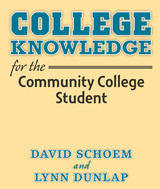
Most students arrive at college not fully aware of just how different the college experience is from other prior experiences. The intellectual and social expectations, as well as the rules and regulations, are different, and not just different from high school.
While all college students must learn to negotiate the transition to college, the challenges for those who enroll in community colleges are unique. Many community college students work, and many work full-time. Many also have family responsibilities—children, partners, and aging parents. A majority of community college students are the first in their family to enroll in college. Some students—both from abroad and from the United States--do not speak English fluently. Some students are retired military personnel. and some are seeking to make a career change. This book strives to speak to this diversity as well as to situations specific to today’s U.S. community college students.
College Knowledge for the Community College Student is a road map and tour guide for a successful community college experience and education. Tips are based on research and the wisdom and advice of other community college students and are designed to help students learn, succeed, graduate, and have a rewarding and fulfilling community college experience.
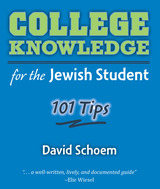
"Students and parents alike will benefit from reading David Schoem's well-written, lively, and documented guide."
---Elie Wiesel
“This is a wonderful sequel to Schoem’s very successful College Knowledge: 101 Tips. As I read through this new volume, I was constantly struck that the advice offered would help all students who approach the college experience with distinctive cultural backgrounds and commitments. Indeed all prospective college students, and their parents, can benefit from this serious yet delightful, well-written and incisive book of advice. I intend to buy one for each of my grandchildren.”
---Harold Shapiro, former president, Princeton University; former president, University of Michigan
For the individual Jewish student who enters college, it is critical that he or she come intellectually, emotionally, and spiritually prepared for the academic and social experience that awaits. College is a qualitatively different experience than high school, and students’ expectations need to be set appropriately. The transition from high school to college is so significant that it can be difficult for most without some preparation.
College Knowledgefor the Jewish Student: 101 Tips is the perfect guide for students heading off to college with high expectations for learning, academic success, personal growth, and independence. Through lively tips and compelling student stories about life at college, it offers thoughtful, practical information for every Jewish student who wants to make a successful transition.
College Knowledge for the Jewish Student includes tips on the academic aspects of college life, like communicating with faculty, learning what is where on campus, where to go for help with coursework, how to manage one’s time for a balanced experience, etc. In addition, it offers advice on dealing with family, finances, health, and safety, as well as the many social and emotional aspects of this important rite of passage.
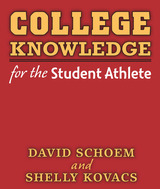
This book was written to support the academic success of student athletes—whether at a large or small university or college, whether team or individual sport, whether women or men, whether on scholarship or not.
While all college students must learn to negotiate the complex transition from high school to college, student athletes face unique challenges, including the complicated set of regulations set out by the NCAA and individual conferences that determine eligibility. The current environment in college athletics makes it even more critical that student athletes understand what they need to do academically and how to avoid potential situations that could jeopardize their athletic careers.
College Knowledge for the Student Athlete is a road map and tour guide for a successful career as a student athlete. Tips are based on research and the authors’ experience, as well as the wisdom and advice of hundreds of former student athletes.
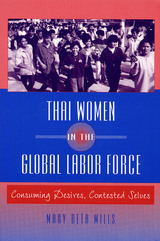
Gender on Campus is the first book to combine solid analyses of the broad range of gender issues for women in college with realistic approaches to heighten awareness and alleviate problems. Written for students, the book first clarifies the concept of feminism and then examines gender dynamics in a variety of settings and contexts-from the classroom to the sports field and from language to social life. Sharon Gmelch probes sexism, racism, and homophobia on campus and surveys the special issues facing diverse women students. The book also addresses issues relating to body image and sexuality. Its final chapters analyze the role gender continues to play after college-in the media, workplace, and politics.
After a thorough discussion of a topic, each chapter concludes with possibilities for action ("What You Can Do") as well as a selected bibliography of books, videos, and organizations that students can consult. Gender on Campus is an invaluable resource for students, parents, and administrators, as well as an excellent text for women's studies courses.
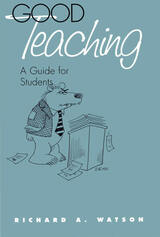
From junior college to Ivy League university, the level of teaching ranges from "great to awful," according to Richard A. Watson, who explains not only how to survive but how to profit from and enjoy your college experience.
To help students make important personal choices—what school? what major? what classes?—Watson explains such broad areas as administrative structure, institutional goals, and faculty aspirations.
Charging the student with the ultimate responsibility for learning, Watson presents certain academic facts of life: teaching is not the primary concern of either the faculty or the administration in most institutions; few professors on the university level have had any training in teaching, and even fewer started out with teaching as their goal; senior professors do not teach much (the higher the rank and salary, the less time in the classroom), and those seeking tenure must emphasize research to survive; and almost certainly, the bad teacher who is a good researcher will get paid more than the good teacher who does not publish.
This is a book about good teaching and how to find it. Rejecting the conventional wisdom that a professor devoted to research will not be effective in the classroom, Watson advises that you take classes from the professor you may have been cautioned to avoid.
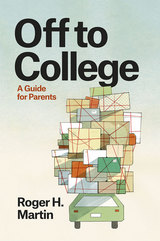
With Off to College, Roger H. Martin helps parents understand this important period of transition by providing the perfect tour of the first year on today’s campus. Martin, a twenty-year college president and former Harvard dean, spent a year visiting five very different colleges and universities across the United States—public and private, large and small, elite and non-elite—to get an insider’s view of modern college life. He observes an advising session as a student sorts out her schedule, unravels the mysteries of roommate assignments with a residence life director, and patrols campus with a safety officer on a rowdy Saturday night. He gets pointers in freshman English and tips on athletics and physical fitness from coaches. He talks with financial aid officers and health service providers. And he listens to the voices of the first–year students themselves. Martin packs Off to College with the insights and advice he gained and bolsters them with data from a wide variety of sources to deliver a unique and personal view of the current student experience.
The first year is not just the beginning of a student’s college education but also the first big step in becoming an adult. Off to College will help parents understand what to expect whether they’re new to the college experience or reconciling modern campus life with memories of their own college days.
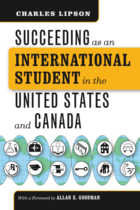
Succeeding is designed to help students navigate the myriad issues they will encounter—from picking a program to landing a campus job. Based on Lipson’s work with international students as well as extensive interviews with faculty and advisers, Succeeding includes practical suggestions for learning English, participating in class, and meeting with instructors. In addition it explains the rules of academic honesty as they are understood in U.S. and Canadian universities.
Life beyond the classroom is also covered, with handy sections on living on or off campus, obtaining a driver’s license, setting up a bank account, and more. The comprehensive glossary addresses both academic terms and phrases heard while shopping or visiting a doctor. There is even a chapter on the academic calendar and holidays in the United States and Canada.

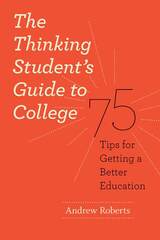
Each fall, thousands of eager freshmen descend on college and university campuses expecting the best education imaginable: inspiring classes taught by top-ranked professors, academic advisors who will guide them to a prestigious job or graduate school, and an environment where learning flourishes outside the classroom as much as it does in lecture halls. Unfortunately, most of these freshmen soon learn that academic life is not what they imagined. Classes are taught by overworked graduate students and adjuncts rather than seasoned faculty members, undergrads receive minimal attention from advisors or administrators, and potentially valuable campus resources remain outside their grasp.
Andrew Roberts’ Thinking Student’s Guide to College helps students take charge of their university experience by providing a blueprint they can follow to achieve their educational goals—whether at public or private schools, large research universities or small liberal arts colleges. An inside look penned by a professor at Northwestern University, this book offers concrete tips on choosing a college, selecting classes, deciding on a major, interacting with faculty, and applying to graduate school. Here, Roberts exposes the secrets of the ivory tower to reveal what motivates professors, where to find loopholes in university bureaucracy, and most importantly, how to get a personalized education. Based on interviews with faculty and cutting-edge educational research, The Thinking Student’s Guide to College is a necessary handbook for students striving to excel academically, creatively, and personally during their undergraduate years.
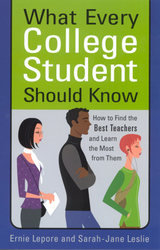
Students do months of research before choosing just the right college, but once theyre on campus, how many of them actually research the professors who are teaching their classes? To optimize your college education you need to find your schools best teachers but how?
What Every College Student Should Know is a guide to discovering the best teachers at your school and learning everything you can from them. Here, the unique writing combination of a professor and a student provides you with perspectives from both sides of the equation. You'll learn:
-
- What questions to ask in selecting an instructor
- How to evaluate professors based on the first class sessions
- What to look for in a syllabus and grading policies
- How to identify a professors teaching style and how to adapt to it
-
- Advice on how to review your exam or paper with your professor
- Ways to build a relationship with a teacher and get invaluable feedback on your work
- Tips on how to get the best recommendations from proffessors
READERS
Browse our collection.
PUBLISHERS
See BiblioVault's publisher services.
STUDENT SERVICES
Files for college accessibility offices.
UChicago Accessibility Resources
home | accessibility | search | about | contact us
BiblioVault ® 2001 - 2025
The University of Chicago Press



